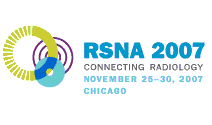
Abstract Archives of the RSNA, 2007
Nisha Sainani MD, Presenter: Nothing to Disclose
Janne Johannes Nappi PhD, Abstract Co-Author: Nothing to Disclose
Dushyant V. Sahani MD, Abstract Co-Author: Researcher, General Electric Company
Consultant, Bracco Group
Hiroyuki Yoshida PHD, Abstract Co-Author: Patent holder, Hologic, Inc
Patent holder, Hologic, Inc (R2 Technology, Inc)
Patent holder, MEDIAN Technologies
To evaluate the performance of an automated computer-aided detection (CAD) algorithm in the detection of small bowel strictures in CTE.
Ten cases (5 males and 5 females; age range 17-83 years) of surgically confirmed small bowel strictures were studied with CTE on 16-MDCT (GE) with 5 mm slice thickness and 2-3 mm coronal reformats. The data were evaluated by a reader for the number and site of strictures. A CAD algorithm was designed to detect stricture-like image patterns based upon Gabor wavelet and CT attenuation features. Using the CAD algorithm, an attempt was made for automated detection of site of strictures. The results of the reader and CAD were correlated with surgical findings.
Reader’s accuracy for the site and number of surgically confirmed strictures was 60% while that of CAD was 35%. CAD detected at least one confirmed stricture in each case. There were 3 false-positive (FP) CAD detections per patient on average, and they were easy to dismiss. Most FP CAD detections (80%) were caused by vessels, collapsed large-bowel segments, and muscle.
The CAD algorithm that we developed has potential for locating sites of small bowel strictures. The FP CAD detections are easy to dismiss.
CAD of small bowel strictures on CTE can have significant impact in improving workflow in emergency setting where even inexperienced readers could use it to rapidly detect the sites of obstructions.
Sainani, N,
Nappi, J,
Sahani, D,
Yoshida, H,
Computer-aided Detection of Small Bowel Strictures in CT Enterography (CTE) in an Emergency Setting: A Pilot Study. Radiological Society of North America 2007 Scientific Assembly and Annual Meeting, November 25 - November 30, 2007 ,Chicago IL.
http://archive.rsna.org/2007/5013767.html

